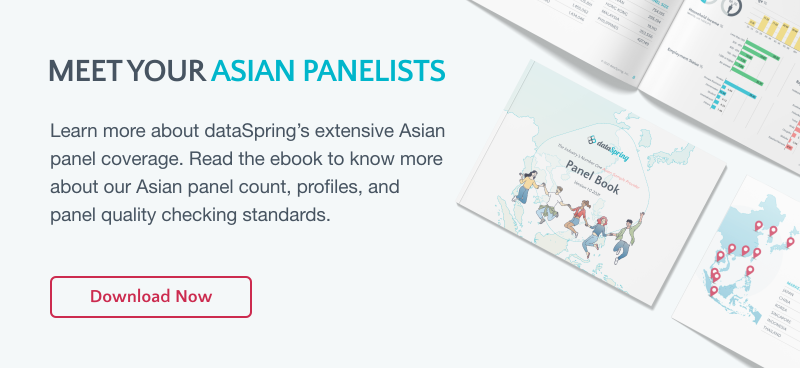
Valentine's Day is widely celebrated as a day of love and holds a special place in the hearts of many people. However, diving into the rich cultures of Asia reveals that other love holidays have been celebrated for centuries, and beyond the traditions, the past few decades have witnessed the emergence of new celebrations related to love that have considerable influence in shaping a new consumer landscape of Asia.
One of these new holidays that influenced the most awaited day for lovers and those in love is White Day in Japan, which started in 1977 in response to a woman's complaint about the unfairness of not receiving any gifts during Valentine's Day, as it is a day meant for giving gifts to confess to men in Japan. The new unofficial holiday gained popularity among women over the years.
Traditional celebrations in Indonesia showcase the Omed-Omedan, or Bali Kissing Festival, a straightforward approach where its ritual involves single men and ladies sharing a kiss. In Eastern China the Qixi festival which has been celebrated since the Han Dynasty (206 BC - 220 AD) has its traditional rituals focused on observing women's dexterity in threading needles, today however the tradition is reduced to eating a pastry called qiaoguo and spending the holiday with partners.
With the multitude of holidays and festivals dedicated to love, it's not surprising that a day to celebrate singlehood has started to emerge as a cynical response to traditional couple-centric holidays. Black Day in South Korea is celebrated every April 14 as a special day for those with bruised hearts to enjoy singlehood while eating their favorite comfort food called jajangmyeon, a dish made of Chinese noodles in black bean paste sauce. Another celebration coming from China is Singles' Day, which started in 1993 when university students in China started hosting parties for single people as a way to curb the stigma of not having a special someone. In 2009, e-commerce giant Alibaba turned the holiday into a major commercial event offering steep discounts and has since become the largest online shopping event that spread to other Asian countries.
These new diverse celebrations not only mirror the changing attitudes towards love but also hint at a future where the consumer market is tailored for single individuals who are now reshaping customs and rituals to align them with their standards.
From Gift Giving to Self-Gifting
Love may be expressed in different ways nevertheless gift-giving still stands out as a profound custom however contrary to tradition, gifts these days are not solely intended for romantic partners.
Valentine's Day in Japan as mentioned is celebrated as a holiday with women giving gifts of chocolates to men and for women to confess their feelings. White Day, happening a month later, is when men get the opportunity to reciprocate their feelings by providing creative gifts. However, in recent years White Day has become less and less significant.
A factor that could have led to White Day winding down is the emergence of singlehood in Japan as people voluntarily choose to stay single resulting in declining marriage and birth rates, and ultimately an aging population.
This unyielding and continuously growing single living has led Japanese moms to gift their sons chocolates for Valentine's Day. Most started giving it from pre-school to elementary with some reaching until post-university years with the gifts earning the nickname "pity chocolates". Even more so, a recent result from Recruit Bridal Research Institute's Romance and Marriage Survey showed that while many men are not married or in a relationship there has been an increasing number in participant demographics of young men in their 20s who said they never had a girlfriend at 46% and those in their 30s at 41.2%.
It's not only coming from the side of men who are showing no interest in having a relationship. For the past 20 years, a notable proportion of single women has increased by 1.5 times, and the percentage of women who were not in a relationship with the opposite sex increased from 27.4% to 40.7%, while that of men rose from 40.3% to 50.8%. Valentine's Day for 2024 proved that this practice persists according to a survey by Intage Group Inc., as more women in Japan are buying chocolates for themselves for Valentine's Day and the gap between women buying their chocolates and those who send gifts to their partners expanded 3.4-fold compared to a 1.7-fold seen in 2023. While the majority of the women from the survey will be buying chocolates for their families, these responses show how diverse people now celebrate the holiday as people embrace being single, with a recent survey revealing that a staggering 60% of Japanese Gen Z youth is not interested in marriage.
Japan is not alone in this social issue, this changing attitude is experienced widely in Asia most comparably to its neighboring countries China and South Korea. China for one has also discovered that 42% of Chinese Gen Z are not looking for love and are reluctant to form families according to a survey report in 2022. Moreover, the number of marriages in the country has hit a record low in 2021 with the birth rate plummeting.
In South Korea, the trend of opting out of marriage has hit its lowest record since 1981, with only 191,700 couples getting married in 2022. The demographics today in South Korea also clearly show a continuous trend away from marriage as more Koreans are more accepting of the idea of staying single to the point that local businesses are forced to offer unmarried employees the same benefits given to married forces to respect the diverse lifestyle that was first called out as unfairness.
In Southeast Asia, Gen Zs are leading this shift. The practice of solo living from this generation is increasingly becoming more influential with the single household making up half of the region already and are growing at 2.4% every year. It is expected to be pronounced in the Philippines, Thailand, and Singapore projected to see 20% increase by 2030 driving change in different sectors to match the emerging new consumer landscape needs and expectations.
Self-Love Revolution
As the perception of love holidays diminishes, even dismissed just as mere commercial pressure by younger generations, this hasn't deterred them from indulging their selves instead every Singles Day. Since its commercialization, it has evolved into an anticipated online shopping event that lasts for weeks -- supposedly to counter Valentine's Day where singles revel in self-love by treating themselves through online shopping sprees. This celebration seems to be enduring and likely to remain as evidenced by the impressive surge in transactions in 2023 consistent with its preceding years. The event is still growing more popular as new shoppers in Southeast Asia also grew by 335% with the sales indicating that from both China and Southeast Asia there's a focus on self-care products and improving home living, a possible indication of the prevalence of single living.
Learn more about the trend in The Rise of the Single-Household In East Asia or read more about the Celebrations of Love in the Asia Pacific Region here in Eye On Asia. See you in our next one!


 Download Panel Book
Download Panel Book


